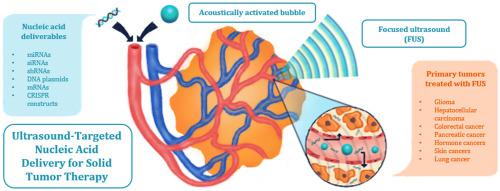Journal of Controlled Release ( IF 10.5 ) Pub Date : 2021-10-14 , DOI: 10.1016/j.jconrel.2021.10.010 Mark R Schwartz 1 , Anna C Debski 1 , Richard J Price 2

|
Depending upon multiple factors, malignant solid tumors are conventionally treated by some combination of surgical resection, radiation, chemotherapy, and immunotherapy. Despite decades of research, therapeutic responses remain poor for many cancer indications. Further, many current therapies in our armamentarium are either invasive or accompanied by toxic side effects. In lieu of traditional pharmaceutics and invasive therapeutic interventions, gene therapies offer more flexible and potentially more durable approaches for new anti-cancer therapies. Nonetheless, many current gene delivery approaches suffer from low transfection efficiency due to physiological barriers limiting extravasation and uptake of genetic material. Additionally, systemically administered gene therapies may lack target-specificity, which can lead to off-target effects. To overcome these challenges, many preclinical studies have shown the utility of focused ultrasound (FUS) to increase macromolecule uptake in cells and tissue under image guidance, demonstrating promise for improved delivery of therapeutics to solid tumors. As FUS-based drug delivery is now being tested in several clinical trials around the world, FUS-targeted gene therapy for solid tumor therapy may not be far behind. In this review, we comprehensively cover the literature pertaining to preclinical attempts to more efficiently deliver therapeutic genetic material with FUS and offer perspectives for future studies and clinical translation.
中文翻译:

用于实体瘤治疗的超声靶向核酸递送
根据多种因素,恶性实体瘤通常通过手术切除、放射、化疗和免疫疗法的某种组合来治疗。尽管经过数十年的研究,许多癌症适应症的治疗效果仍然不佳。此外,我们的医疗库中目前的许多疗法要么是侵入性的,要么伴有毒副作用。基因疗法代替传统药剂学和侵入性治疗干预措施,为新的抗癌疗法提供了更灵活且可能更持久的方法。尽管如此,由于生理屏障限制了遗传物质的外渗和摄取,许多当前的基因递送方法都存在转染效率低的问题。此外,系统性基因治疗可能缺乏靶标特异性,这可能导致脱靶效应。为了克服这些挑战,许多临床前研究表明,聚焦超声 (FUS) 可在图像引导下增加细胞和组织中大分子的摄取,这证明了改善实体瘤治疗递送的前景。由于基于 FUS 的药物输送目前正在世界各地的多项临床试验中进行测试,用于实体瘤治疗的 FUS 靶向基因疗法可能也不会落后太多。在这篇综述中,我们全面涵盖了与 FUS 更有效地递送治疗性遗传物质的临床前尝试有关的文献,并为未来的研究和临床转化提供了前景。











































 京公网安备 11010802027423号
京公网安备 11010802027423号